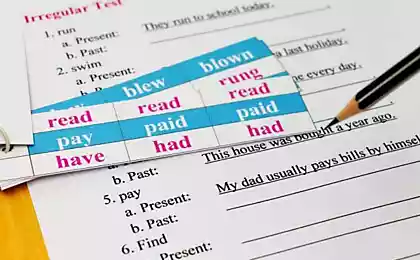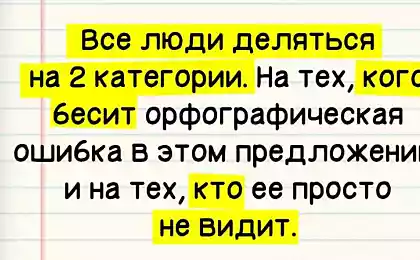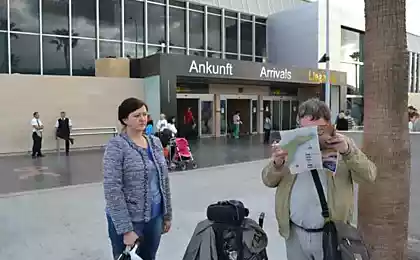673
10 verbs that are worth to forget once and for all. So do not say!
Psychologists have found that 25% of the impressions we formed with our speech. Talking can almost everything, but the right to inform the whole point, right to express ideas, to pick up the necessary forms and expressions of the strength is not for everyone.
Some mistakes are made so often that even he did not know how to speak. This is especially true of verbs, which are the number one stumbling block in Russian. Sometimes people invent their forms such that you wonder how all this could have imagined. Variants are so different that he has often confused as well.
Therefore, .cc publishes the top 10 verbs that do not give rest to anyone who wants to learn how to speak and clean. After reading this, you're never going to be confused, what form to choose. Arrange for all points of the "i" once and for all!
1. To come or arrive? This verb, if it is written in the text correctly, can become an irritant number one. That he is a standard set of errors that, from the point of view of many, immediately determine the level of literacy. Now, into your minds: "come" - is wrong. The correct form is only one - to "come." Such writing approved the Rules of Russian spelling and punctuation of 1956. However, as noted by some sources, until 1956 in many publications could be found and the option to "come." Apparently, many people still live in those distant times.
2. Go. Even the worst elementary school student knows that "ehay" - it is a terrible ignorance. But what then should be the imperative of the verb "ed" or maybe "Go"? In fact, a form of "ehay" even less scary than "ed." "Ehay" - is currently vernacular, but the forms of "ed" does not exist in the dictionary. "Go" - is closer to the truth, yet only spoken form. "Go" - another formulation. Until now, none of them is considered to be absolutely correct! "Go" and "Go" - an equal shape and both colloquial, just a second longer entrenched in the language. And most importantly - both forms are considered to be not quite right in the literary sense, as verbs "be based", "dawn", "establish", "go" - not according to the rules are imperative.
3. Plant or plant? to plant cucumbers, tomatoes, cabbage and other gifts chalet is possible, but carefully. That's because "plant" - a people's conversational style, just such a mark is in the dictionary. The verb "plant" and "plant" refers to the so-called parallel forms, which correspond to a neutral style of the Russian literary language. The verb "plant" is more widespread in speech communication. The verb "plant" can not have a set-top box; the verb "plant" forms prefixed forms.
4. Burning or zhget? The verb "oven", "burn" and "cut" error occurs frequently. Every now and then you hear the word "zhget", "peket" or "striget." Take a mental note that, for example, the verb "burn" is only one form of the letter "r" - "harness." In all other forms of the words of this letter is not and can not be. So the author zhget or still burning?
5. Stoop or naginatsya? Use the form "naginatsya" possible is the wrong version, does not allow any style "but." Only the "bend". Remember that once and for all.
6. Pylesoshu or a vacuum cleaner? There is only one standard variant - "pylesoshu," he recorded in dictionaries. However, it seems wrong to many. Most likely, this is due to the dissonant forms. That is why many people try to avoid it and look for alternatives. And to do this it is not necessary.
7. Moves or moves? And here is both possible, they are absolutely equal. This is the Russian language is rare, but still happens.
8. Climb or climb? The verb "climb" - the vernacular, so it is better not to use. Try to always use the literary form "climb».
9. Waves or waving? Options "Maha" and "waved" allowed some dictionaries as the conversational, but if you follow the purity of speech, it is best to avoid them. Instead, to use the form "waves", "Weave».
10. To put or lay down? Joking aside, often in schools sounded the question: "Tell me finally how to: lay down or lay down?" Remember that this verb does not exist, it is easy. In the literary language of the verb "to lay down" is not used, only with prefixes, but the verb "put" - without attachments. That is why "poklast" or "pereklast" - it's just as illiterate, as well as "lay down". Henceforth never confuse!
I hope you're never going to allow these silly mistakes. After all, the ability to properly and competently speak wonderfully describes you as a person. So what words and forms you used in speech and writing, will tell more about you than you would even have thought. So do not let yourself fall face in the dirt!
Urgent share with your friends by these rules - never late to learn!
via takprosto cc
Some mistakes are made so often that even he did not know how to speak. This is especially true of verbs, which are the number one stumbling block in Russian. Sometimes people invent their forms such that you wonder how all this could have imagined. Variants are so different that he has often confused as well.
Therefore, .cc publishes the top 10 verbs that do not give rest to anyone who wants to learn how to speak and clean. After reading this, you're never going to be confused, what form to choose. Arrange for all points of the "i" once and for all!
1. To come or arrive? This verb, if it is written in the text correctly, can become an irritant number one. That he is a standard set of errors that, from the point of view of many, immediately determine the level of literacy. Now, into your minds: "come" - is wrong. The correct form is only one - to "come." Such writing approved the Rules of Russian spelling and punctuation of 1956. However, as noted by some sources, until 1956 in many publications could be found and the option to "come." Apparently, many people still live in those distant times.
2. Go. Even the worst elementary school student knows that "ehay" - it is a terrible ignorance. But what then should be the imperative of the verb "ed" or maybe "Go"? In fact, a form of "ehay" even less scary than "ed." "Ehay" - is currently vernacular, but the forms of "ed" does not exist in the dictionary. "Go" - is closer to the truth, yet only spoken form. "Go" - another formulation. Until now, none of them is considered to be absolutely correct! "Go" and "Go" - an equal shape and both colloquial, just a second longer entrenched in the language. And most importantly - both forms are considered to be not quite right in the literary sense, as verbs "be based", "dawn", "establish", "go" - not according to the rules are imperative.
3. Plant or plant? to plant cucumbers, tomatoes, cabbage and other gifts chalet is possible, but carefully. That's because "plant" - a people's conversational style, just such a mark is in the dictionary. The verb "plant" and "plant" refers to the so-called parallel forms, which correspond to a neutral style of the Russian literary language. The verb "plant" is more widespread in speech communication. The verb "plant" can not have a set-top box; the verb "plant" forms prefixed forms.
4. Burning or zhget? The verb "oven", "burn" and "cut" error occurs frequently. Every now and then you hear the word "zhget", "peket" or "striget." Take a mental note that, for example, the verb "burn" is only one form of the letter "r" - "harness." In all other forms of the words of this letter is not and can not be. So the author zhget or still burning?
5. Stoop or naginatsya? Use the form "naginatsya" possible is the wrong version, does not allow any style "but." Only the "bend". Remember that once and for all.
6. Pylesoshu or a vacuum cleaner? There is only one standard variant - "pylesoshu," he recorded in dictionaries. However, it seems wrong to many. Most likely, this is due to the dissonant forms. That is why many people try to avoid it and look for alternatives. And to do this it is not necessary.
7. Moves or moves? And here is both possible, they are absolutely equal. This is the Russian language is rare, but still happens.
8. Climb or climb? The verb "climb" - the vernacular, so it is better not to use. Try to always use the literary form "climb».
9. Waves or waving? Options "Maha" and "waved" allowed some dictionaries as the conversational, but if you follow the purity of speech, it is best to avoid them. Instead, to use the form "waves", "Weave».
10. To put or lay down? Joking aside, often in schools sounded the question: "Tell me finally how to: lay down or lay down?" Remember that this verb does not exist, it is easy. In the literary language of the verb "to lay down" is not used, only with prefixes, but the verb "put" - without attachments. That is why "poklast" or "pereklast" - it's just as illiterate, as well as "lay down". Henceforth never confuse!
I hope you're never going to allow these silly mistakes. After all, the ability to properly and competently speak wonderfully describes you as a person. So what words and forms you used in speech and writing, will tell more about you than you would even have thought. So do not let yourself fall face in the dirt!
Urgent share with your friends by these rules - never late to learn!
via takprosto cc
The whole truth about autoimmune diseases: do not ignore the usual symptoms!
6 exercises to burn calories and effective weight loss by summer. Feel like a goddess on the beach!






















